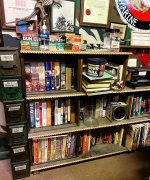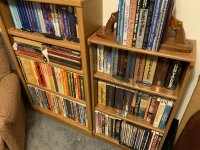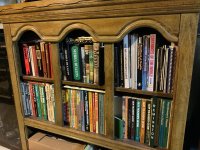RM Vivas
US Veteran
Over on the SWCA Forum (you have to join to read it, but you should really join anyway if you're seriously into S&W) someone asked if others collected gun books. This put me to mind thinking about my gun book notions and I posted them over there. I'm adding them here too because I think books have a very important role in collecting.
======================================
Books.
When I was growing up in Brooklyn, there were these three old guys who used to hang out in front of an apartment building up the street every morning, solving the worlds problems, having a smoke and catcalling broads.
One of them was a fellow named Larry. Larry was an older guy, probably about 70 or so. Larry had been born in the apartment that he was currently living in (he would later die in that same apartment). His entire life had been spent living in the neighborhood. He was one of these guys who thought you needed a passport if you were going over the George Washington Bridge and out of NYC and he didn’t have a passport.
There was only one time in his life he ever left our neighborhood for any amount of time and that was because Uncle Sam asked in the 1940’s.
Larry became an Aviation Cadet and had the best/worst run of luck a man could have at that time. He did all his class time, did all his flying time and got his wings as a fighter pilot on……..08MAY45. That’s right. He became a fighter pilot on the day the war in Europe ended!
Now some folks would consider that good luck. Your chances of having a Messerschmidt come up behind you and beam your <bad word> were now nil; you’d survive the war.
Larry, on the other hand, in the parlance of Uncle Sam’s Misguided Children, wanted to get some! Since the European war was game over but the Pacific war was still in play, Larry switched over to multi engine school. If he couldn’t be fighter pilot, then he’d be a bomber pilot.
You can pretty much guess what happened. Did his class time, got some stick time and got his multi-engine rating the week that the Japs got nuked.
A month later he grabbed a bus from the airbase he was training at (which is now part of Hofstra University), went back to Brooklyn, walked into the apartment and hung his uniforms up in the hallway closet. They stayed there until he died; I saw them.
Larry’s peacetime gig was he worked for a sporting goods outfit (I can’t recall which one). As such, he handled a lot of their sporting arms deals. He was also a huge Civil War collector. He only specialized in what he called the Orange Blossoms; Brooklyn Civil War Union Regiments. He was a -very- serious but very low-key collector. It would not be an exaggeration to say he was to Brooklyn Civil War collecting what Wilson was to Colts or Jinks to S&W. Larry was -good-!
He was the sort of fellow who might have an inscribed 1860 Army and then he’d have a CDV of it’s owner, a copy of a reunion program listing that owner as a speaker, a photo of the owner in his old age, and all sorts of supporting documents and photographs. If he had collected contemporary weapons he’d be a stalker.
Books.
Larry knew that this young know-nothing kid had an interest in guns and we would talk guns for hours out there on the sidewalk as Brooklyn went past us in its various forms.
Larry was an encyclopedia of knowledge. He was very well read and had really gotten into the gun trade/collecting during the ‘Golden Era’ of the early 1950’s into the early 1960’s, when the world was awash with WW2 surplus and folks wanting to get rid of old stuff for all the new fangled guns and optics and cartridges.
All of this leads up to what I consider the absolute best piece of collecting advice I ever got and that I try to pass on:
“Robbie, every time you buy a gun, buy a book.”
It was Larrys way of saying that the difference between accumulating and collecting was having the knowledge to understand your guns place in history; what came before it and what came after it and why. I think it was also his way of saying that knowledge truly is power when it comes to collecting. At minimum it keeps you from making a bad deal and at best it helps make good deals.
Sometimes people will mistakenly call me an expert and I always point out to them that an expert is a guy who knows -one- more fact about something than they do. Hey, a truly gifted weatherman only has to be correct %51 of the time!
I took Larrys advice to heart and not only did I buy (and devour!) a book every time I bought a gun, I started buying books about the guns that interested me -before- I bought them. I figured this way I’d be ready when ‘that deal’ came along.
And I was right!
I look at the bad deals I’ve made in my life. Not the ‘bad’ deals where I sold something cheap because I was in dire financial straits or the like, but the ‘bad’ deals where I lost money because I lacked knowledge. All those deals were before I read the books on my particular gun of interest. Once I become well read on say, Registered Magnums, I –KNEW—that I’d get one at worst, market value and at best, ‘oy, such a deal’ price. And I did!
Some folks know that I once had a very nice Mexican Target Model. I saw it transact a while back for a sum that even I was impressed with. I won’t tell you what I paid for it because the guy who has it now might use the gun to shoot himself if he knew what I paid. I got that deal because a week before I found that gun, I had gotten a copy of Jinks’ book and recognized the gun from an image in there.
Over the years I built quite a little library. Then I noticed an odd thing. Those books I bought for $29.99 or $39.99 in the 1980’s and 1990’s were selling now for $800 a pop! It turned out that many good gun reference books (The Riflemans Rifle, Winchester Lever Legacy, etc.) go out of print and for one reason or another are never reprinted (copyright issues, vengeful ex-wives, uncaring idiot children, etc.) and the value of those books go up.
At the time I had my shop I used to buy three of every book I’d purchase: a copy for my office at home, a copy to keep in the shop and a copy for future re-sale. Now I don’t have the shop anymore so I just buy two copies and I still think it’s a good plan. You may not need a second copy of “Colt: An American Legend” or some similar generic coffee table book, but when someone publishes a new 300 page illustrated monograph on Japanese WW2 handguns or German target pistols from 1880 to 1939, you can be pretty sure that those will become standard references and are obscure enough that there may not be enough perceived interest at a later date for another run. Look at what a first edition SCSW goes for now!
Buy books. Buy -good- books. Read your good books. You should have a minimum gun:book ratio of 1:5 and that’s a minimum. Collecting guns is a small part of the big picture; we also collect and share the knowledge about the guns to improve the experience and increase the enjoyment for ourselves and other collectors.
An accumulator collects guns. A collector reads books about the guns he likes. A serious collector -corrects- the books about the guns he likes.
So, yeah. I collect the books and I use them to better my collection, increase my enjoyment of the hobby and I use the information I glean to help other collectors to enjoy the hobby more as well.
Best,
RM Vivas
======================================
Books.
When I was growing up in Brooklyn, there were these three old guys who used to hang out in front of an apartment building up the street every morning, solving the worlds problems, having a smoke and catcalling broads.
One of them was a fellow named Larry. Larry was an older guy, probably about 70 or so. Larry had been born in the apartment that he was currently living in (he would later die in that same apartment). His entire life had been spent living in the neighborhood. He was one of these guys who thought you needed a passport if you were going over the George Washington Bridge and out of NYC and he didn’t have a passport.
There was only one time in his life he ever left our neighborhood for any amount of time and that was because Uncle Sam asked in the 1940’s.
Larry became an Aviation Cadet and had the best/worst run of luck a man could have at that time. He did all his class time, did all his flying time and got his wings as a fighter pilot on……..08MAY45. That’s right. He became a fighter pilot on the day the war in Europe ended!
Now some folks would consider that good luck. Your chances of having a Messerschmidt come up behind you and beam your <bad word> were now nil; you’d survive the war.
Larry, on the other hand, in the parlance of Uncle Sam’s Misguided Children, wanted to get some! Since the European war was game over but the Pacific war was still in play, Larry switched over to multi engine school. If he couldn’t be fighter pilot, then he’d be a bomber pilot.
You can pretty much guess what happened. Did his class time, got some stick time and got his multi-engine rating the week that the Japs got nuked.
A month later he grabbed a bus from the airbase he was training at (which is now part of Hofstra University), went back to Brooklyn, walked into the apartment and hung his uniforms up in the hallway closet. They stayed there until he died; I saw them.
Larry’s peacetime gig was he worked for a sporting goods outfit (I can’t recall which one). As such, he handled a lot of their sporting arms deals. He was also a huge Civil War collector. He only specialized in what he called the Orange Blossoms; Brooklyn Civil War Union Regiments. He was a -very- serious but very low-key collector. It would not be an exaggeration to say he was to Brooklyn Civil War collecting what Wilson was to Colts or Jinks to S&W. Larry was -good-!
He was the sort of fellow who might have an inscribed 1860 Army and then he’d have a CDV of it’s owner, a copy of a reunion program listing that owner as a speaker, a photo of the owner in his old age, and all sorts of supporting documents and photographs. If he had collected contemporary weapons he’d be a stalker.
Books.
Larry knew that this young know-nothing kid had an interest in guns and we would talk guns for hours out there on the sidewalk as Brooklyn went past us in its various forms.
Larry was an encyclopedia of knowledge. He was very well read and had really gotten into the gun trade/collecting during the ‘Golden Era’ of the early 1950’s into the early 1960’s, when the world was awash with WW2 surplus and folks wanting to get rid of old stuff for all the new fangled guns and optics and cartridges.
All of this leads up to what I consider the absolute best piece of collecting advice I ever got and that I try to pass on:
“Robbie, every time you buy a gun, buy a book.”
It was Larrys way of saying that the difference between accumulating and collecting was having the knowledge to understand your guns place in history; what came before it and what came after it and why. I think it was also his way of saying that knowledge truly is power when it comes to collecting. At minimum it keeps you from making a bad deal and at best it helps make good deals.
Sometimes people will mistakenly call me an expert and I always point out to them that an expert is a guy who knows -one- more fact about something than they do. Hey, a truly gifted weatherman only has to be correct %51 of the time!
I took Larrys advice to heart and not only did I buy (and devour!) a book every time I bought a gun, I started buying books about the guns that interested me -before- I bought them. I figured this way I’d be ready when ‘that deal’ came along.
And I was right!
I look at the bad deals I’ve made in my life. Not the ‘bad’ deals where I sold something cheap because I was in dire financial straits or the like, but the ‘bad’ deals where I lost money because I lacked knowledge. All those deals were before I read the books on my particular gun of interest. Once I become well read on say, Registered Magnums, I –KNEW—that I’d get one at worst, market value and at best, ‘oy, such a deal’ price. And I did!
Some folks know that I once had a very nice Mexican Target Model. I saw it transact a while back for a sum that even I was impressed with. I won’t tell you what I paid for it because the guy who has it now might use the gun to shoot himself if he knew what I paid. I got that deal because a week before I found that gun, I had gotten a copy of Jinks’ book and recognized the gun from an image in there.
Over the years I built quite a little library. Then I noticed an odd thing. Those books I bought for $29.99 or $39.99 in the 1980’s and 1990’s were selling now for $800 a pop! It turned out that many good gun reference books (The Riflemans Rifle, Winchester Lever Legacy, etc.) go out of print and for one reason or another are never reprinted (copyright issues, vengeful ex-wives, uncaring idiot children, etc.) and the value of those books go up.
At the time I had my shop I used to buy three of every book I’d purchase: a copy for my office at home, a copy to keep in the shop and a copy for future re-sale. Now I don’t have the shop anymore so I just buy two copies and I still think it’s a good plan. You may not need a second copy of “Colt: An American Legend” or some similar generic coffee table book, but when someone publishes a new 300 page illustrated monograph on Japanese WW2 handguns or German target pistols from 1880 to 1939, you can be pretty sure that those will become standard references and are obscure enough that there may not be enough perceived interest at a later date for another run. Look at what a first edition SCSW goes for now!
Buy books. Buy -good- books. Read your good books. You should have a minimum gun:book ratio of 1:5 and that’s a minimum. Collecting guns is a small part of the big picture; we also collect and share the knowledge about the guns to improve the experience and increase the enjoyment for ourselves and other collectors.
An accumulator collects guns. A collector reads books about the guns he likes. A serious collector -corrects- the books about the guns he likes.
So, yeah. I collect the books and I use them to better my collection, increase my enjoyment of the hobby and I use the information I glean to help other collectors to enjoy the hobby more as well.
Best,
RM Vivas





